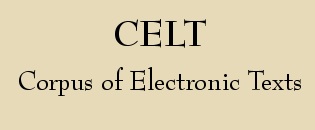|
Early Irish Poetry to c.1200
" Slowly, ..., the fact is becoming recognised in ever wider circles
that the vernacular literature of ancient Ireland is the most primitive
and original among the literatures of Western Europe, and that in its
origins and development it affords a most fascinating study. Whatever
may be its intrinsic merit, its importance as the earliest voice from
the dawn of West European civilisation cannot be denied."
"It was only on the outskirts of the Continental world, and
beyond the sway and influence of the Roman Empire, that some vigorous
nations preserved their national institutions intact, and among
them there are only three whom letters reached early enough to
leave behind some record of their pagan civilisation in a vernacular
literature. These were the Irish, the Anglo-Saxons, and, comparatively
latecomers, the Icelanders."
"It was during this period [4th century onwards] that the
oral literature, handed down by many generations of bards and
story-tellers, was first written down in the monasteries. Unfortunately,
not a single tale, only two or three poems, have come down to
us from these early centuries in contemporary manuscripts. In
Ireland itself most old books were destroyed during the Viking
terror which burst upon the island at the end of the eighth century.
But, from the eleventh century onward, we have an almost unbroken
series of hundreds of MSS. in which all that had escaped destruction
was collected and arranged. Many of the tales and poems thus preserved
were undoubtedly originally composed in the eighth century; some
few perhaps in the seventh; and as the Irish scholarship advances,
it is not unlikely that fragments of poetry will be found which,
from linguistic or internal evidence, may be claimed for the sixth
century."
"The purely lyrical poetry of ancient Ireland may be roughly
divided into two sections--that of the professional bard attached
to the court and person of a chief; and that of the unattached
poet, whether monk or itinerant bard."
"Religious poetry ranges from single quatrains to lengthy
compositions dealing with all the varied aspects of religious
life. Many of them give us a fascinating insight into the peculiar
character of the early Irish Church, which differed in so many
ways from the rest of the Christian world."
"In Nature poetry the Gaelic muse may vie with that of any
other nation. Indeed, these poems occupy a unique position in
the literature of the world. To seek out and watch and love Nature,
in its tiniest phenomena as in its grandest, was given to no people
so early and so fully as to the Celt. Many hundreds of Gaelic
and Welsh poems testify to this fact."
"Of ancient love-songs comparatively little has come down
to us. What we have are mostly laments for departed lovers."
"The commonest stanza is a quatrain consisting of heptasyllabic
lines with the rhyme at the end of the couplet."
Kuno Meyer, Ancient Irish Poetry (London 1913, repr. 1994),
vii, viii, x-xi, xii, xiii.
Eleanor Knott, Irish Classical Poetry (Cork: Mercier
Press revd. ed. 1966), contains some information on early poetry.
 |

